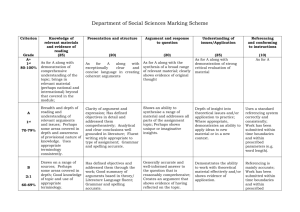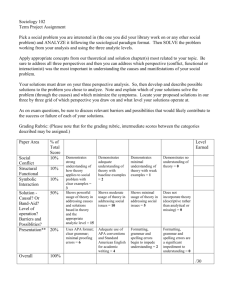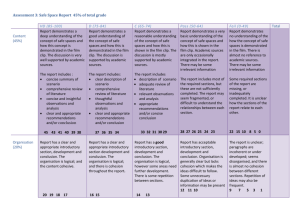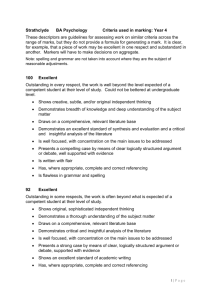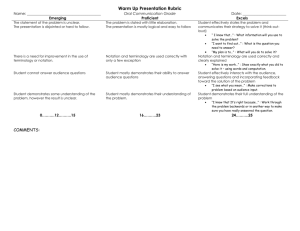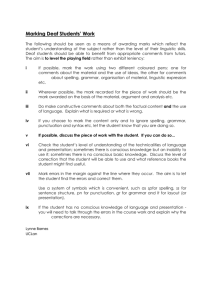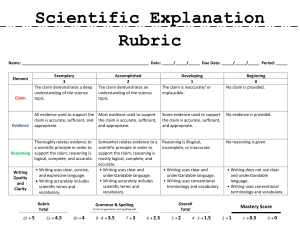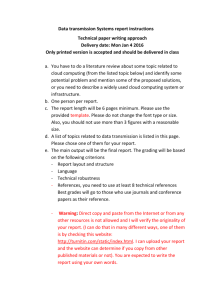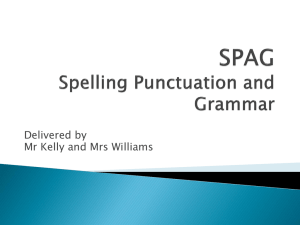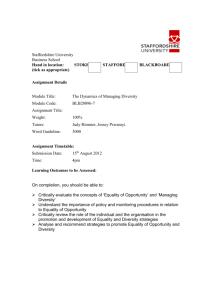Assignment Description
advertisement
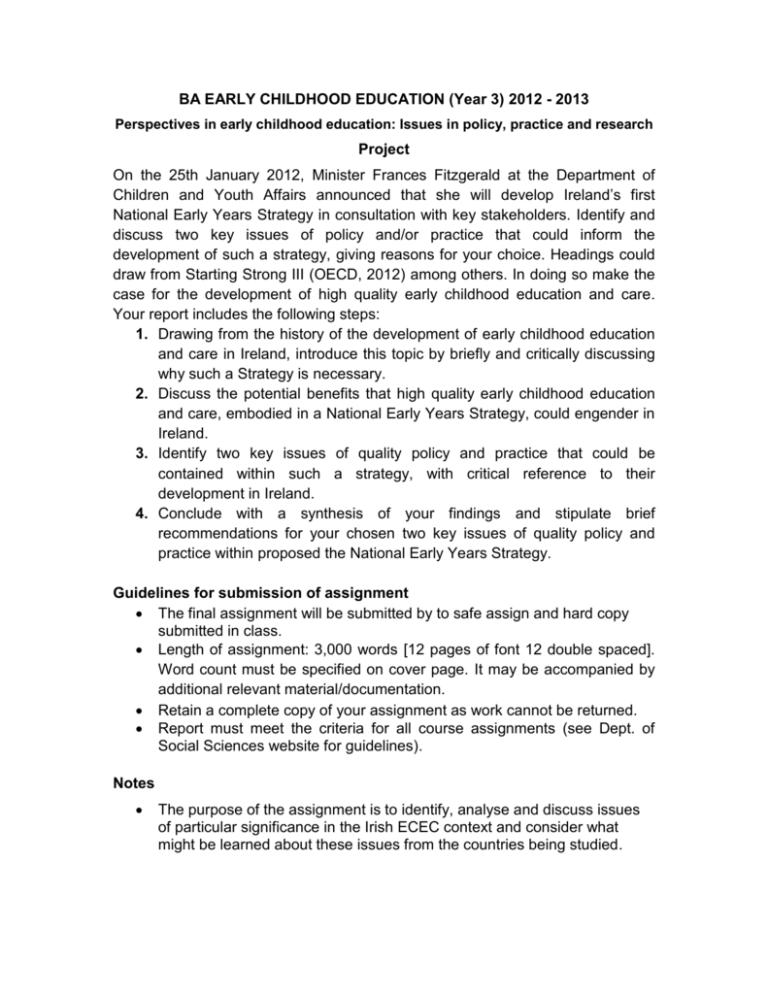
BA EARLY CHILDHOOD EDUCATION (Year 3) 2012 - 2013 Perspectives in early childhood education: Issues in policy, practice and research Project On the 25th January 2012, Minister Frances Fitzgerald at the Department of Children and Youth Affairs announced that she will develop Ireland’s first National Early Years Strategy in consultation with key stakeholders. Identify and discuss two key issues of policy and/or practice that could inform the development of such a strategy, giving reasons for your choice. Headings could draw from Starting Strong III (OECD, 2012) among others. In doing so make the case for the development of high quality early childhood education and care. Your report includes the following steps: 1. Drawing from the history of the development of early childhood education and care in Ireland, introduce this topic by briefly and critically discussing why such a Strategy is necessary. 2. Discuss the potential benefits that high quality early childhood education and care, embodied in a National Early Years Strategy, could engender in Ireland. 3. Identify two key issues of quality policy and practice that could be contained within such a strategy, with critical reference to their development in Ireland. 4. Conclude with a synthesis of your findings and stipulate brief recommendations for your chosen two key issues of quality policy and practice within proposed the National Early Years Strategy. Guidelines for submission of assignment The final assignment will be submitted by to safe assign and hard copy submitted in class. Length of assignment: 3,000 words [12 pages of font 12 double spaced]. Word count must be specified on cover page. It may be accompanied by additional relevant material/documentation. Retain a complete copy of your assignment as work cannot be returned. Report must meet the criteria for all course assignments (see Dept. of Social Sciences website for guidelines). Notes The purpose of the assignment is to identify, analyse and discuss issues of particular significance in the Irish ECEC context and consider what might be learned about these issues from the countries being studied. The report should not describe policies and practices of Ireland or another country (appendices can be used sparingly for descriptive material). You must refer to relevant Irish law, policies and practices to support your choice of topics for discussion. It is important to adopt a critical approach in reviewing policies and practices in Ireland and from other countries. Dr Geraldine French, January, 2013 Essay Title: Perspectives in Early Childhood Education Name of student: Criterion Grade A 1st 70% + B 2:1 2:2 50-59% D Pass 40-49% Fail 39% - PTO for further feedback Understanding of the topic, critical thinking and analysis/application (30%) Breadth and depth of reading and understanding of relevant arguments and issues; Perhaps some areas covered in depth and awareness of provisional nature of knowledge. Uses appropriate terminology consistently. Depth of insight into theoretical issues and/or application to practice; Where appropriate, demonstrates an ability to apply ideas to new material or in a new context. Critical thinking applied coherently. Clarity of argument and expression; Has defined objectives/themes in detail and addressed them comprehensively; Shows an ability to synthesise a wide range of material and addresses all parts of the assignment topic; Perhaps shows unique or imaginative insights. Fluent writing style appropriate to type of assignment; Grammar and spelling accurate. Structure of the assignment adhered to; Uses the standard referencing system correctly and consistently; Work has been submitted within time boundaries and within prescribed parameters (e.g. word length). Analytical and clear recommendations/conclusions wellgrounded in text Draws on a range of sources; Perhaps some areas covered in depth; Good knowledge of topic and use of appropriate terminology. Demonstrates strong ability to work with theoretical material effectively and/or shows strong evidence of application. Critical thinking in evidence. Has defined objectives/themes and addressed them through the work; Generally accurate and well-informed answer to the question that is reasonably comprehensive; Creates an argument that shows evidence of having reflected on the topic. Good summary of arguments based in theory/Literature. Language fluent. Grammar and spelling accurate. Structure of the assignment mostly adhered to; Referencing is mainly accurate; Work has been submitted within time boundaries and within prescribed parameters (e.g. word length). Recommendations include but not specified Uses a limited range of source material; Reasonable knowledge of topic and some use of appropriate terminology. Demonstrates the ability to address theoretical material and/or shows evidence of application. Some critical thinking in evidence. Has outlined objectives/themes and addressed them at the end of the work; Addresses main issues of assignment topic without necessarily covering all aspects. Develops + communicates a basic logical argument with some use of appropriate supporting examples and evidence. Some evidence of recommendations/conclusions grounded in theory/literature; Language mainly fluent; Grammar and spelling mainly accurate. Structure of the assignment somewhat adhered to; Referencing is fairly accurate; Work has been submitted within time boundaries and within prescribed parameters (e.g. word length). Shows only sparse coverage of relevant material or contains some errors and omissions; Limited knowledge of topic but some use of appropriate terminology. Overdependence on class slides. Shows some sign of understanding of the question set, though not necessarily sustained; Demonstrates a basic ability to address theoretical material and/or shows limited evidence of application. Limited critical thinking in evidence. Has provided generalised objectives/themes and focused the work on the topic area; Limited evidence of conclusions supported by theory/literature; Meaning apparent but language not always fluent; Grammar and/or spelling contain errors. Fails to support arguments with adequate evidence. An attempt at following the structure of the assignment; Some attempt at referencing; Deviates slightly from the required parameters. Contains very little appropriate material or contains numerous errors and omissions; Lacks evidence of knowledge relevant to the topic and/or significantly misuses terminology; Is plagiarised. Demonstrates a lack of understanding of theoretical material and/or lacks application. No critical thinking in evidence. Only briefly acknowledges the question if at all; No information provided regarding objectives/themes of assignment; Lacks any real argument or argument is illogical and incoherent. Unsubstantiated/invalid conclusions based on anecdote and generalisation only, or no conclusions at all; Meaning unclear +/or grammar +/or spelling contain frequent errors. No attempt to follow the structure of the assignment adhered to; Referencing is absent or unsystematic; Deviates significantly from the required parameters. 60-69% C Mark: Knowledge of content, accuracy and evidence of reading (30%) Clarity, cohesiveness and synthesis (in general discussion and recommendations) (30%) General criteria: Presentation and structure, Referencing (10%) Perspectives in early childhood education: Issues in policy, practice and research Feedback Sheet - Code: DT572/3 Lecturer: Dr Geraldine French Mark: Participant’s name: Knowledge of content (accuracy of content and evidence of reading - 30%): Areas of strength Areas for modification 2. Understanding of the topic (critical thinking and analysis- 30%): Areas of strength Areas for modification 3. Clarity, cohesiveness and synthesis (in general discussion and recommendations for policy and /or practice - 30%): Areas of strength Areas for modification 4. General Criteria (presentation, introduction/conclusion, referencing - 10%): Areas of strength Areas for modification
